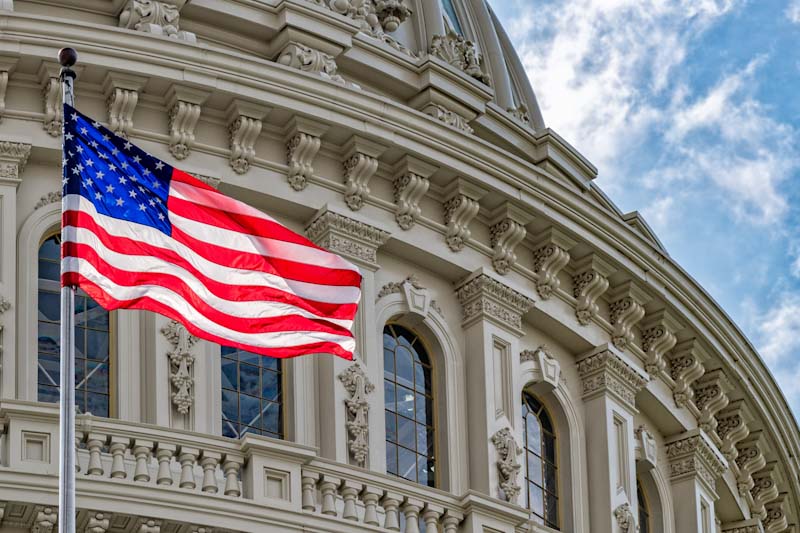This website uses cookies so that we can provide you with the best user experience possible. Cookie information is stored in your browser and performs functions such as recognising you when you return to our website and helping our team to understand which sections of the website you find most interesting and useful.
News
Legislative Update: Appropriations & COVID-19 Relief
The House and Senate have returned from Thanksgiving recess to push through the last part of a lame-duck session. Legislators have only seven more legislative days to complete several must-pass bills, including the National Defense Authorization Act and the 12 annual appropriations bills to avoid a government shutdown.
House Leadership Elections
Before leaving for recess, the House held its leadership elections reelecting Rep. Nancy Pelosi (D-CA) as Speaker of the House by her caucus. She will preside over the slimmest Democrat majority since World War II after Republicans picked up at least 10 seats. Currently, the House tally is at 222 to 209 with four races still to call. Of those races, one is a toss-up in Iowa, and the rest are projected to remain Republican.
Top Democratic leaders, Majority Leader Steny Hoyer (D-MD) and Majority Whip Jim Clyburn (D-SC) ran unopposed and were approved by the caucus to serve in those roles next year. Representatives Tony Cardenas (D-CA) and Sean Patrick Maloney (D-NY) are vying to run the House Democrats’ campaign arm after Rep. Cheri Bustos (D-IL) announced that she would run again.
Republicans reelected Kevin McCarthy (R-CA) as its Majority Leader. Rep. Steve Scalise (R-LA) will serve as minority whip, and Rep. Liz Cheney (R-WY) will remain House GOP Conference chair.
Senate Leadership Elections
In the Senate, Senators Mitch McConnell (R-KY) and Chuck Schumer (R-NY) were reelected as their Senate party leaders. The Senate awaits to see which party will be in the majority after two Georgia runoff elections in January. Currently, the results stand with Republicans leading 50 to 48. Sen. John Thune (SD) remains the Republican whip, and Sen. John Barrasso (WY) keeps his post as Republican Conference Chairman.
Sen. Dick Durbin (IL) was reelected as Democratic whip and Sen. Patty Murray (WA) was once again picked to be the Democrats’ assistant leader. Sen. Cory Booker (NJ) will be vice-chair of the Democratic Policy and Communications Committee (DPCC) and Sen. Cortez Masto (NV) will be vice-chair of outreach.
Appropriations
On Nov. 16, the Senate Appropriations Committee released drafts of all 12 annual spending bills for FY 2021, setting up negotiations for a deal ahead of the Dec. 11 deadline to keep the government funded. After being bogged down in controversies over issues such as police reform and COVID-19 spending, the panel failed to release a single bill through regular order ahead of the start of the new fiscal year on Oct. 1.
The House advanced all 12 appropriations bills through committee and 10 of them across the House floor. Senate Appropriations Committee Chairman Richard Shelby (R-AL) praised the bills while the committee’s vice chairman Sen. Patrick Leahy (D-VT) criticized the bills for omitting sufficient coronavirus relief funding. There is still a question of whether appropriators will attempt to add COVID relief as the deadline looms.
COVID-19 Relief
Congressional interest in a coronavirus relief legislation has been revived after months of the stalled negotiations. A bipartisan group of senators introduced a broad coronavirus aid framework on Dec. 1. The proposal, spearheaded by Sens. Joe Manchin (D-WV) and Susan Collins (R-ME), would provide $908 billion in aid and short-term liability protection for businesses. The measure repurposes $560 billion in unused funds from the CARES Act, adding $348 billion in new spending. The legislation also includes:
- $160 billion in state and local aid,
- $180 billion in additional unemployment insurance,
- and $288 billion in aid for small businesses.
The framework also grants funding for schools, transportation, health care, and nutrition programs. Given how closely the Senate will be divided no matter which side wins in Georgia, support for any legislation from moderate Senators Manchin and Collins will be an absolute necessity for anything to pass in Congress.
House Speaker Pelosi (D-CA) has reinitiated talks with Treasury Secretary Steven Mnuchin after talks fell apart just before the November elections. Pelosi and Senate Minority Leader Chuck Schumer (D-NY) offered a proposal to Republican leaders on Monday night. Mnuchin agreed to review the Pelosi-Schumer offer, as well as the bipartisan Senate proposal that was unveiled today, Pelosi said in a statement.
Meanwhile, Senate Leader Mitch McConnell on Tuesday circulated a revised version of his “targeted” coronavirus relief package among his caucus. McConnell says his proposal has the administration’s backing and the best path forward given that Congress’s tight time frame to pass the measure. The bill’s price tag will likely be more than his previous $500 billion proposal but does not include state and local aid, which is a sticking point for some senators. The legislation also only extends expiring unemployment benefits through the end of January. It provides moderate funding for schools, hospitals, and small businesses across many sectors, and also includes liability reform.


